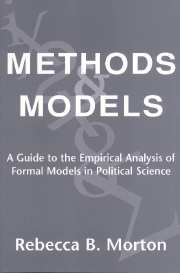1 - Political Science's Dilemma
Published online by Cambridge University Press: 10 December 2009
Summary
The Problem
Sophisticated Methods without Theory
Political scientists have become adept at applying – from economics and other disciplines – exciting new statistical methods to analyze data. Even more noteworthy, political science “methodologists” are making their own contributions to the development of statistical techniques used in the discipline. As Bartels and Brady (1993) argue, many now expect political science graduate students in the field of methodology to use high-level econometric texts and to be versed in nonlinear estimation procedures, generalized least squares, ordered probit analysis, maximum likelihood, and so forth.
Yet this increase in complexity is not without costs. As the use of methodological techniques in political science has advanced, researchers have found that often their empirical study leads to more questions, questions that need theoretical input. However, because little existing theory is relevant or because the well-developed theory that does exist seems unconnected to the empirical issues, typically the response is to use more sophisticated methods or data gathering to answer the questions without reference to a fully developed theory. But these newmethods often lead to still more questions, which in turn result in the use of more sophisticated methods to gather or analyze the data. The connection to theory seems to get lost in the methodological discussion. Rarely do researchers take the empirical results and rework the theoretical framework that began the discussion.
Example: Are Incumbents Spendthrifts? Consider the progression of research on the effects of campaign expenditure levels on voter choices in elections. After campaign spending data became available in 1972, political scientists began to examine the extent to which campaign spending affects the number of votes a candidate receives.
- Type
- Chapter
- Information
- Methods and ModelsA Guide to the Empirical Analysis of Formal Models in Political Science, pp. 3 - 30Publisher: Cambridge University PressPrint publication year: 1999



